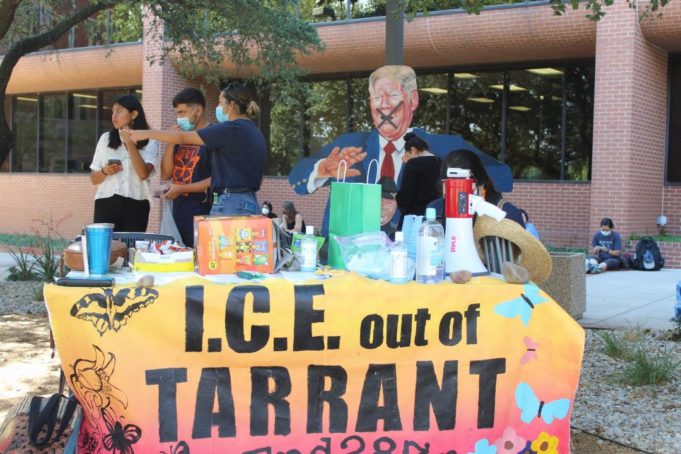Earlier today, Tarrant County renewed a contract with Immigration and Customs Enforcement (ICE) that can fast-track illegal immigrants for deportation.
Tarrant County commissioners Gary Fickes, J.D. Johnson, and Glen Whitley voted to renew the county’s three-year-old 287(g) agreement, in which members of Tarrant County law enforcement can essentially serve as ICE agents.
The commissioners’ court amended the agreement to include an annual review. Commissioners Devan Allen and Roy Charles Brooks renewed their vote against the pact with ICE.
In closing after six hours of public statements, Brooks said that he “feels the pain” of the dozens who testified, most critics of the agreement.
“I am left with one option, and that is to believe what they say,” he said.
Johnson noted that, unlike last year, Brooks supported the 287(g) agreement two years ago.
“Well, you know, I’m two years older now,” he said. “I oppose it because symbolism matters.”
Held on the fifth floor of the County Administration Building downtown, the meeting brought critic Jessica Ramirez, volunteer leader of the grassroots group ICE Out of Tarrant County, who addressed Whitley.
“We are here yet again,” she said. “I wanted to thank Devan Allen and Roy Brooks for being with us in this fight. You said we have failed to provide you with data. It is not my job to give you data. That is your job as an elected official, especially when you are voting. You didn’t want to feel guilty about how you voted. At the end of the day, you are a racist person, and that is never going to change.”
Ramirez and other critics of the 287(g) program say that by working with ICE — an agency known for stoking fear in Hispanic communities — Tarrant County is discouraging collaboration between law enforcement and local minorities and immigrants.
Rick Barnes, chairman of the Tarrant County Republican Party, spoke in favor of the agreement.
The safety and security of all citizens in Tarrant County depend on it, he said.
The vote marks a political victory for Sheriff Bill Waybourn, who brought Tarrant County into a voluntary pact with ICE through the agreement shortly after taking office in 2017 (“ICE’d Out?,” May 27). The 287(g) program allows for the sheriff’s office to review immigration status on inmates. If a Tarrant County inmate is believed to be in the country illegally, that prisoner is handed to ICE agents instead of being released or paroled.
Opponents of the controversial agreement formed the grassroots group ICE Out of Tarrant County last year to raise awareness of ways that the program alienates and frightens parts of the Hispanic community — something Waybourn steadfastly denies.
Last month, Waybourn told me in an email that 287(g) is intended to prevent repeat offenders, even though illegal immigrants are less likely to commit or re-commit a crime than U.S. citizens, according to the libertarian think tank the Cato Institute and a recent study by Justice Quarterly.
The sheriff’s office provided data about crimes committed by undocumented Tarrant County inmates. The figures, which were limited to April, include homicide (nine), sexual assault (71), escaped fugitives (nine), and burglary (17).
ICE Out of Tarrant County, United Fort Worth, and other progressive grassroots groups have stated that one of their main focuses this year will be supporting a full slate of reform-minded candidates at the city and county level this November.












